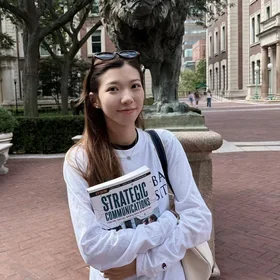A group of students in Columbia’s Nonprofit Management program recently published “Strategic Philanthropy Gets a Wake-Up Call,” a five-point roadmap for philanthropy, in Nonprofit Quarterly. The students met in Dr. Ali Webb’s Strategic Philanthropy class.
“Over the past 20 years, the philanthropic sector has moved to a more business-like, data-driven approach, which has come to be called strategic philanthropy,” the co-authors write. “The key elements of this approach—goal setting, strategy development, and measurement—have strengthened the field in some ways. An unintended consequence, however, has been to increase the distance between grant-seekers and grantmakers, creating a chasm between philanthropy and the communities philanthropy purports to serve, with the outcome that, more often than not, philanthropy reinforces structural racism.”
The group of students are Kyle Layne (Founder and Principal of PROmethean IMPACT LLC, a fundraising and philanthropic consulting firm driven by social impact); Jackie Bennett (Program Director for the Global Federation of Animal Sanctuaries, working with wildlife centers in Africa and Asia); Cayla Damick (Major Gifts Assistant at Doctors Without Borders/ Médecins Sans Frontières); Ben Murphy (Director of Program Development for the New York-based Hillside Family of Agencies); and Kirsten Swanson (Individual and Corporate Giving Manager for the Anchorage Museum).
Daniel Salas (Development Officer at Weill Cornell Medicine) is the Associate Instructor of the course and a Nonprofit Management alum. Dr. Webb is the President and CEO of Ali Webb Strategies, a consultancy that advises leaders and advances strategies that help organizations bridge the gap between expectations and outcome to reverse historical inequities.
The students list five areas of philanthropic practice that have the potential to address inequities and transform philanthropy to meet the current societal needs.
1. Recognize Interconnected Challenges of Structural Racism
The BIPOC community has contended with racism and inequality throughout the ongoing pandemic, which has led to a disproportionate amount of suffering. The philanthropy sector must recognize the interconnected nature of societal challenges “to also recognize the interconnected systems that many of our problems stem from.”
2. Empower Community Voices
Think of grantees as equal partners to move beyond the white savior complex that permeates so much of philanthropic practice. “Solutions to the world’s most complex problems can be found only through communication, collaboration, and trust—and philanthropy must move past deeply ingrained and insular practices.”
3. Embrace Failure
Philanthropy must support nonprofits that take risks, and move from “a rigid viewpoint of win/lose to an iterative approach, which values mistakes as insight to be leveraged towards future success.”
4. Reimagine Impact
The field should avoid vanity metrics and reimagine how impact is measured. The co-authors recommend “SMART (specific, measurable, achievable, relevant, time-bound) metrics, measurable key performance indicators, and sound theories of change based in large part on the experiences of those inside of the community.”
5. Commit to Scalability
For the field to address these global issues, philanthropy must embrace systems-level change. “A truly scalable solution must take on issues of complexity while maintaining the flexibility to evolve.”
The article concludes with a call to action: strategic philanthropy must rise to the moment, and leaders must reshape philanthropy to meet the urgent needs of our time. Read the full article in Nonprofit Quarterly.
Learn more about Columbia’s M.S. in Nonprofit Management, which prepares graduates for leadership roles within mission-driven organizations in a wide variety of contexts, including global and community nonprofits, foundations, education, healthcare, the arts, or as fundraising and development experts.


